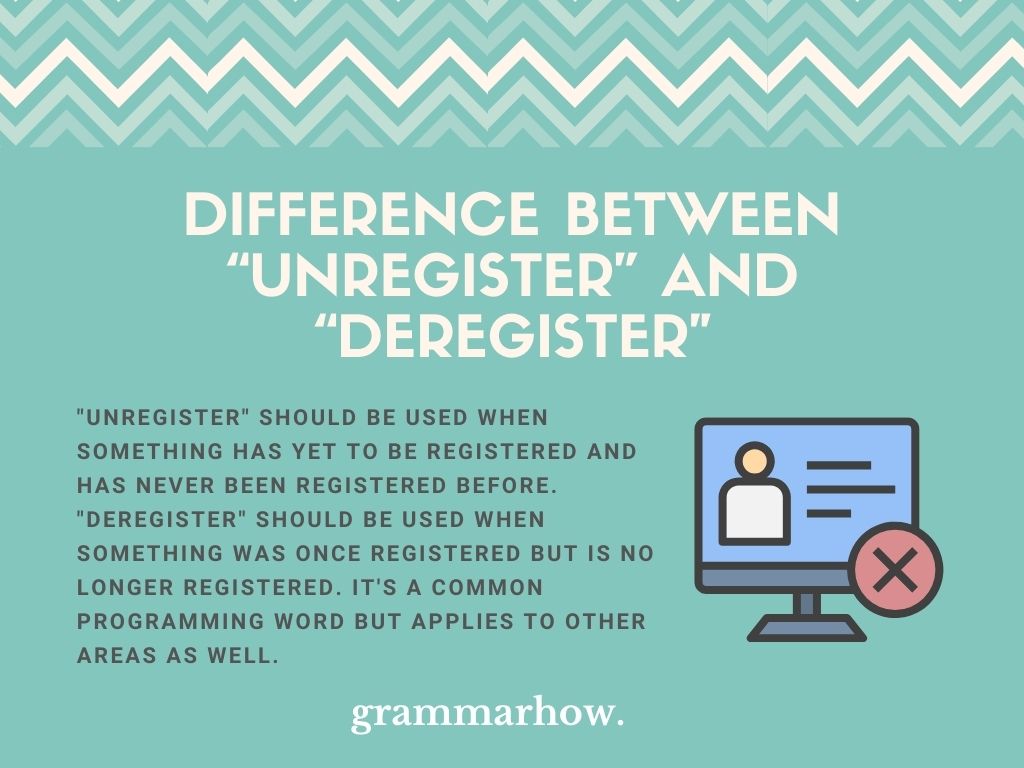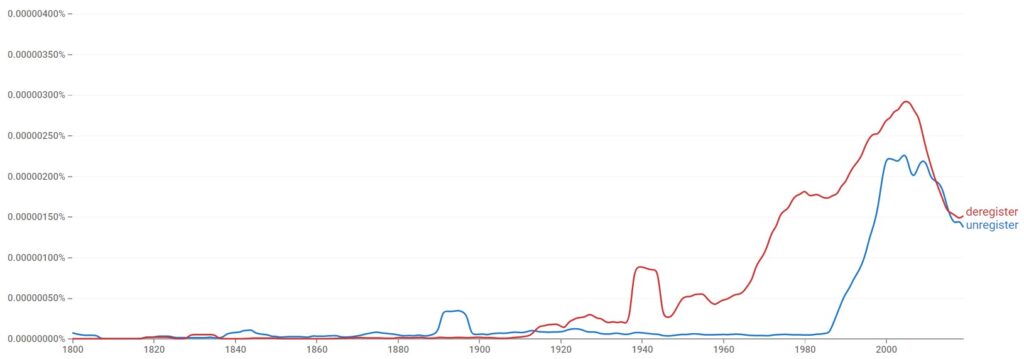While there isn’t much difference in direct meaning between the two words unregister and register, this article will explore the finer subtleties between them. That way, you can start using them yourself the way they were intended.
What Is The Difference Between “Unregister” And “Deregister”?
“Unregister” should be used when something has yet to be registered and has never been registered before. “Deregister” should be used when something was once registered but is no longer registered. It’s a common programming word but applies to other areas as well.

Generally, the prefixes “un-” and “de-” are used interchangeably. However, “un-” often means something has never happened yet, while “de-” shows the process of something being removed from the original state (in this case, the state of registration).
Is Unregister Or Deregister Used The Most?
We can take a look at the two words a little closer to see whether one is more popular than the other.
Interestingly enough, from this graph, we can see that “deregister” was always the more popular choice of the two in the later 1900s, but eventually, “unregister” caught up, and now they’re about equal.

Most of the growth from “unregister” seems to be closely related to the age of technology and the time when the internet and the worldwide web took off. Perhaps it had a lot to do with unregistered websites and programming ideals that people went through, making it a more common word in daily English.
7 Examples Of How To Use “Unregister” In A Sentence
Let’s look at some examples of how we can use the two words in sentences. We’ll start with “unregister” to see how this will look and try to use as many situations for it as possible.
- The building is unregistered and legal.
- We can’t unregister the information now that it’s been registered.
- I don’t think you understand how registers work. We can’t just unregister them!
- This is an unregistered document that’s never been filed.
- These are unregistered files, so be careful with them.
- Where can I find the unregistered listings?
- Why is all of this unregistered equipment left out?
From these examples, you can see how it’s most common to use “unregister” in the past tense when describing things that have never been registered.
7 Examples Of How To Use “Deregister” In A Sentence
Now let’s look at some examples of when “deregister” applies. Remember, the “de-” prefix implies that something was once registered but is no longer on any register.
- We have deregistered your permissions in this system.
- They told me all these documents had been deregistered.
- We need to deregister all the files with sensitive information in them.
- Can we deregister this code easily?
- Not until you deregister this building will I be able to plan my new build.
- Make sure you deregister all of the important things around here so no one can find them.
- How do I deregister in this program again?
As you can see, we can use “deregister” in the present tense much more easily than we can use “unregister.” That’s because “deregister” often shows the action of taking something off of a register, which is a process we can carry out in real-time.
Unregister And Deregister – Synonyms
Let’s quickly look through some alternatives of the two words to see whether any of these ones look good to use. We can always replace words with more familiar ones if we prefer. It also helps to expand our vocabulary and knowledge.
- Unsubscribe
If you specifically want to be taken off of a mailing register, you can unsubscribe from it. Generally, this refers to bulk emails sent out by companies.
- Unlist / De-list
It’s also possible to use both prefixes before the word “list” to use the same meaning as before.
Is It “Deregistration” Or “De Registration”?
When we want to refer to the noun form rather than the verb form “deregister,” it’s important to know how to spell it.
“Deregistration” is the correct spelling and the only one that should be used. “De registration” is incorrect and uses a space where there shouldn’t be one. “De-” is a prefix and not a standalone word. It holds no meaning without a word connected to it.

Martin holds a Master’s degree in Finance and International Business. He has six years of experience in professional communication with clients, executives, and colleagues. Furthermore, he has teaching experience from Aarhus University. Martin has been featured as an expert in communication and teaching on Forbes and Shopify. Read more about Martin here.
